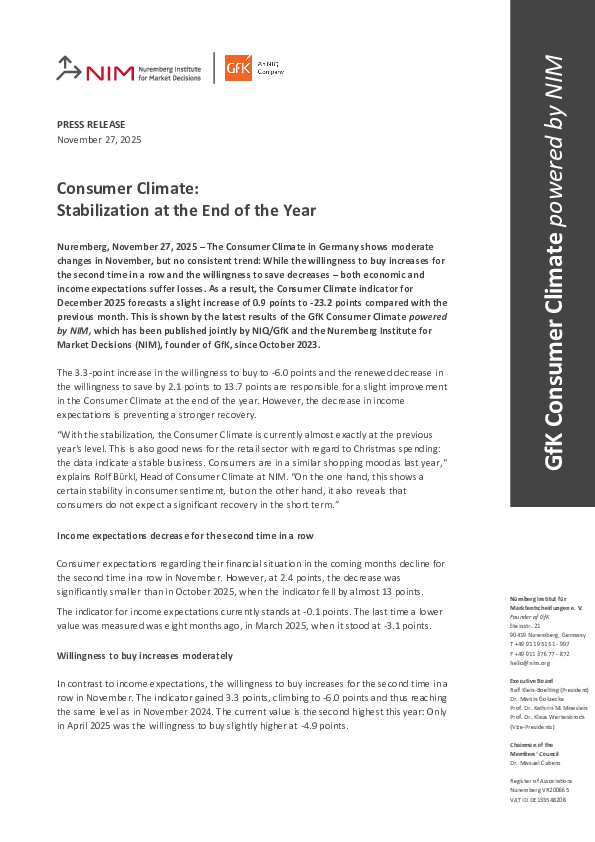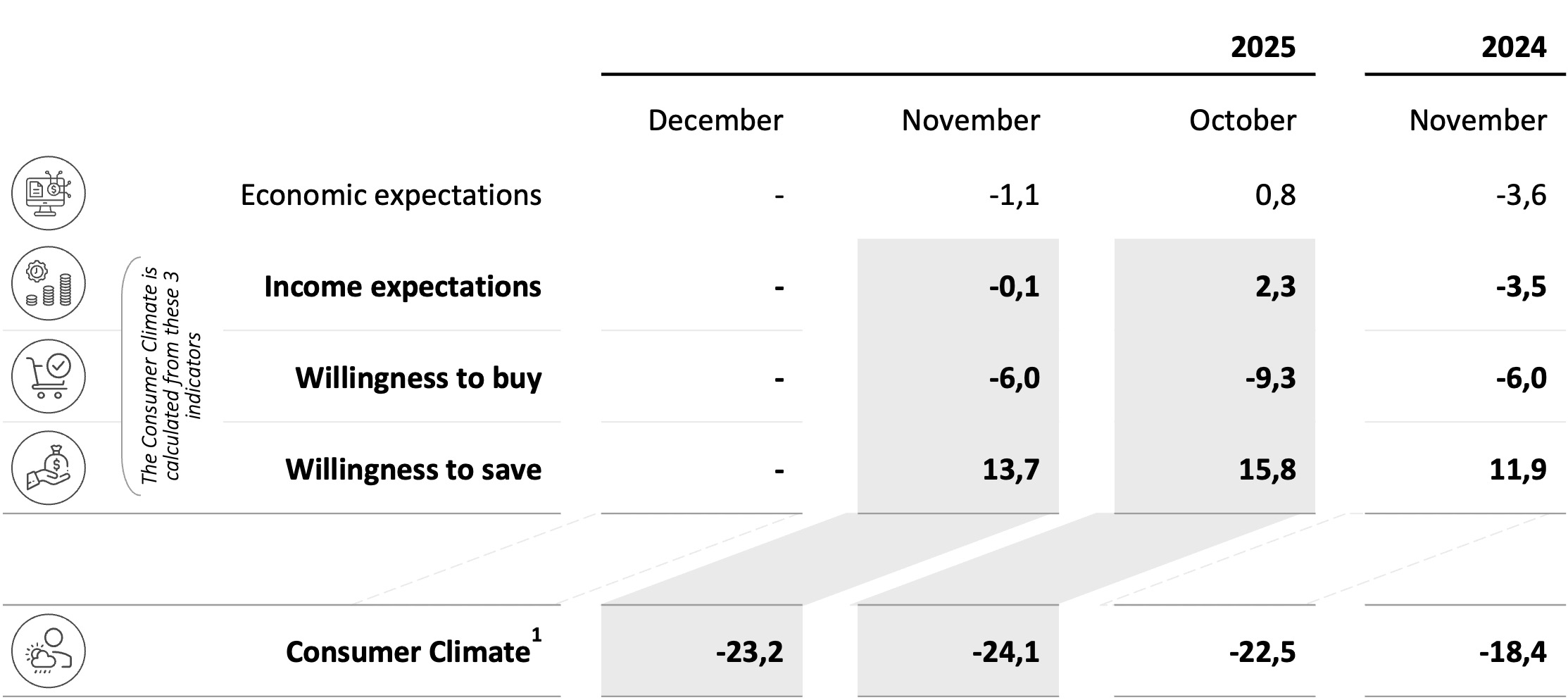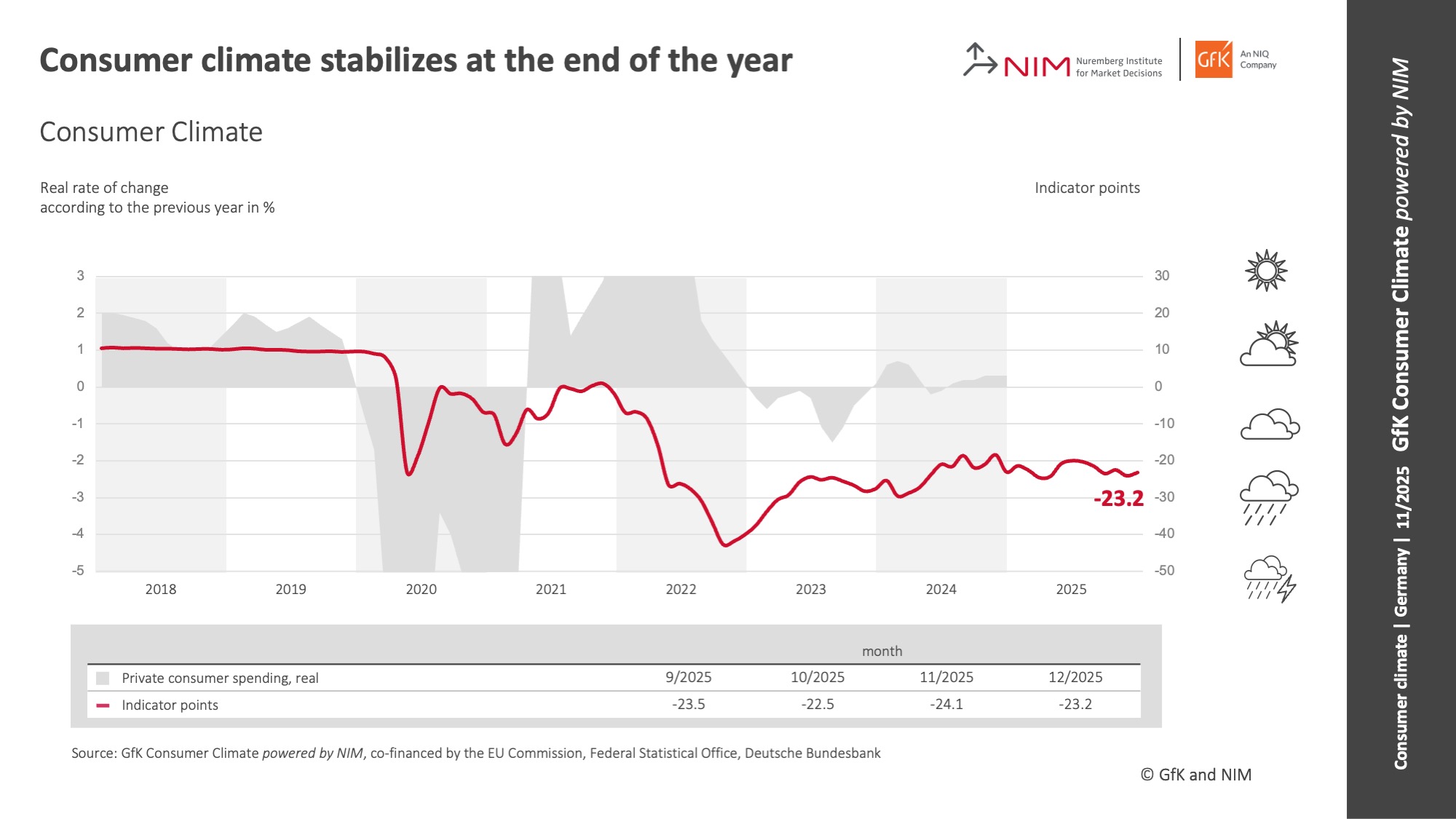Publications
2025
Consumer Climate: Stabilization at the End of the Year
Nuremberg, November 27, 2025 – The Consumer Climate in Germany shows moderate changes in November, but no consistent trend: While the willingness to buy increases for the second time in a row and the willingness to save decreases – both economic and income expectations suffer losses. As a result, the Consumer Climate indicator for December 2025 forecasts a slight increase of 0.9 points to -23.2 points compared with the previous month. This is shown by the latest results of the GfK Consumer Climate powered by NIM, which has been published jointly by NIQ/GfK and the Nuremberg Institute for Market Decisions (NIM), founder of GfK, since October 2023.
The 3.3-point increase in the willingness to buy to -6.0 points and the renewed decrease in the willingness to save by 2.1 points to 13.7 points are responsible for a slight improvement in the Consumer Climate at the end of the year. However, the decrease in income expectations is preventing a stronger recovery.
“With the stabilization, the Consumer Climate is currently almost exactly at the previous year's level. This is also good news for the retail sector with regard to Christmas spending: the data indicate a stable business. Consumers are in a similar shopping mood as last year," explains Rolf Bürkl, Head of Consumer Climate at NIM. “On the one hand, this shows a certain stability in consumer sentiment, but on the other hand, it also reveals that consumers do not expect a significant recovery in the short term.”
Income expectations decrease for the second time in a row
Consumer expectations regarding their financial situation in the coming months decline for the second time in a row in November. However, at 2.4 points, the decrease was significantly smaller than in October 2025, when the indicator fell by almost 13 points.
The indicator for income expectations currently stands at -0.1 points. The last time a lower value was measured was eight months ago, in March 2025, when it stood at -3.1 points.
Willingness to buy increases moderately
In contrast to income expectations, the willingness to buy increases for the second time in a row in November. The indicator gained 3.3 points, climbing to -6.0 points and thus reaching the same level as in November 2024. The current value is the second highest this year: Only in April 2025 was the willingness to buy slightly higher at -4.9 points.
Economic expectations decrease slightly
German consumers remain cautious in their assessment of the economic expectations for the coming 12 months. The indicator decreases by 1.9 points compared with the previous month, dropping to -1.1 points. However, compared with the same period last year, the economic indicator still shows a slight increase of 2.5 points. Consumers continue to expect no significant recovery in the near term.
The following table shows the values of the individual indicators in November 2025 compared to the previous month and previous year:
1Consumer Climate can be interpreted as a leading indicator of consumer behavior in Germany. Analyses have shown that sentiment is an early indicator for the actual development of private consumption. The Consumer Climate is calculated from the November values for income expectations, willingness to buy and willingness to save - as a leading indicator for the development of consumption in December 2025.
The following diagram shows the development of the Consumer Climate indicator over the last few years:
Planned publication dates in 2025 and Q1 2026 (CET):
Friday, December 19, 2025, 8:00 a.m.
Wednesday, January 28, 2026, 8:00 a.m.
Wednesday, February 25, 2026, 8:00 a.m.
Thursday, March 26, 2026, 8:00 a.m.
About the method
The survey period for the current analysis was from was from 30 October to 10 November 2025.
The results are extracted from the “GfK Consumer Climate powered by NIM” study and are based on around 2,000 consumer interviews conducted on behalf of the European Commission. The report presents the indicators in the form of graphics accompanied by brief comments. Consumer sentiment refers explicitly to all private consumer spending. Depending on the definition used, however, retail accounts for only around 30 percent of private consumer spending. Services, travel, housing costs, healthcare services, and the wellness sector as a whole account for the rest. Again, this does not apply to retail sales, but instead to total consumer spending. Like all other indicators, willingness to buy is a confidence indicator. It indicates whether consumers currently consider it advisable to make larger purchases. Even if they answer “Yes” to this question, there are two further requirements for making a purchase: The consumer must have both money required for such a large purchase and must also see a need to make this purchase. Furthermore, this only concerns durable consumer goods that also require a larger budget.
GfK Consumer Climate powered by NIM
The GfK Consumer Climate survey, which is being conducted regularly since 1974 and monthly since 1980, is regarded as an important indicator of German consumer behavior and a guiding light for Germany’s economic development. Since October 2023, the Consumer Climate data collected by GfK has been analyzed and published jointly with the Nuremberg Institute for Market Decisions (NIM), the founder of GfK. By joining forces, it will be possible to invest further in the analysis and development of the Consumer Climate study to gain an even better understanding of the background to changes in consumer confidence.
Media Contact:
NIM: Sandra Lades, T +49 911 95151 989, sandra.lades@nim.org
NIQ: Julia Mayer, T +351 932 640 305, julia.mayer@nielseniq.com
Nuremberg Institute for Market Decisions e. V.
The Nuremberg Institute for Market Decisions (NIM) is a non-profit research institute at the interface between science and practice. The NIM investigates how consumer decisions change as a result of new technologies, social trends or the application of behavioral science and what micro- and macroeconomic effects this has on the market and society. A better understanding of consumer decisions and their effects helps society, companies, politicians and consumers to make better decisions in the interests of a socio-ecological market economy and "prosperity for all".
The Nuremberg Institute for Market Decisions is the founder of GfK.
Further information at www.nim.org/en and LinkedIn.
GfK – a NielsenIQ company
For 90 years, clients around the world have trusted us to provide data-driven answers to key questions for their decision-making processes. We support their growth through our comprehensive understanding of buying behavior and the dynamics that influence markets, brands, and media trends. In 2023, industry leaders GfK and NielsenIQ have merged to offer their clients unparalleled global reach. With a holistic view of retail and the most comprehensive consumer insights, provided by forward-looking analytics on state-of-the-art platforms, GfK is driving “Growth from Knowledge.” More information is available at www.nielseniq.com.
About NIQ
NielsenIQ (NIQ) is a leading consumer intelligence company, delivering the most complete understanding of consumer buying behavior and revealing new pathways to growth. NIQ combined with GfK in 2023, bringing together two industry leaders with unparalleled global reach. Our global reach spans over 90 countries covering approximately 85 percent of the world’s population and more than $ 7.2 trillion in global consumer spend. With a holistic retail read and the most comprehensive consumer insights—delivered with advanced analytics through state-of-the-art platforms—NIQ delivers the Full View™.
For more information, please visit www.niq.com



![[Translate to English:] [Translate to English:]](/fileadmin/_processed_/e/2/csm_R.Buerkl_NIM_22c3502ef5.png)